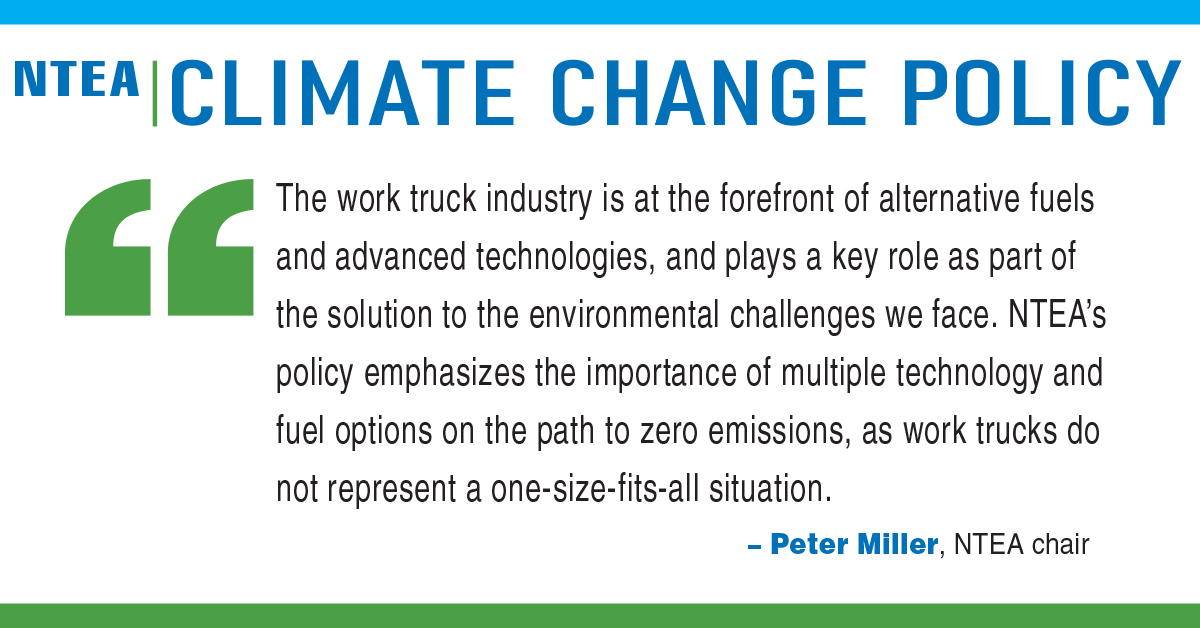
NTEA’s Board of Directors adopted a climate change policy that commits the Association to continue facilitating productive use of alternative fuels and advanced technologies for work trucks. The policy explains the work truck industry represents a positive force in reducing greenhouse gas emissions. Further, it provides NTEA the opportunity to educate the public, regulators and legislators about how the industry is already putting in place solutions to society’s environmental concerns.
“The work truck industry is at the forefront of alternative fuels and advanced technologies, and plays a key role as part of the solution to the environmental challenges we face,” said Peter Miller, NTEA chair. “NTEA’s policy emphasizes the importance of multiple technology and fuel options on the path to zero emissions, as work trucks do not represent a one-size-fits-all situation.”

“Climate change is a serious global challenge that requires long-term commitments — and every industry has a role to play,” said Mike Kastner, NTEA managing director. “NTEA recognizes the work truck industry is well-positioned to make a significant difference through continued development of innovative new technologies to reduce fuel consumption and vehicle greenhouse gas (GHG) emissions. The industry will produce vocational trucks for the future that both increase overall vehicle efficiency and reduce GHGs on the path to zero emissions.”
Vehicle diversity
Work trucks come in many sizes and configurations. One may make last-mile/-kilometer deliveries while another stays at the jobsite with an aerial bucket repairing utility lines. The fuels and advanced technologies that make one vehicle efficient and clean may not make sense for another truck doing a different type of work.
NTEA has created a community umbrella under which manufacturers, designers and users can gather to learn about all the options that can make a work truck both efficient and environmentally responsible. Green Truck Summit has been held annually in conjunction with Work Truck Week since 2008. Green Truck Association, an NTEA operating division, was formed in 2010 as a resource for legislative and regulatory updates, market data, technical and engineering solutions, and timely news on clean vehicle products and initiatives.
Work trucks are part of a low-carbon future
According to U.S. Environmental Protection Agency (EPA), “The transportation sector generates the largest share of greenhouse gas emissions (28.2% of total GHG emissions in 2018). Greenhouse gas emissions from transportation primarily come from burning fossil fuel for our cars, trucks, ships, trains, and planes. Some 90% of the fuel used for transportation is petroleum-based, which includes primarily gasoline and diesel.”
NTEA is committed to supporting continuous improvement and innovation — in terms of products and technologies the industry produces — that result in GHG emissions reduction and climate solutions. We support evidence-based policies designed to further these goals and move society toward a low-carbon future.
The work truck industry views the transition to a low-carbon future as a path to zero emissions that allows for multiple routes encompassing a wide range of fuels, technologies, innovations, and new materials. The Association and industry recognize different fuels and technologies may be beneficial in diverse market applications. “NTEA is dedicated to building knowledge and acceptance of technologies that will reduce GHG emissions,” said Steve Carey, NTEA president & CEO. “Further, we support and develop driver training and vehicle purchasing education to further enhance vehicle efficiency.”
NTEA’s principles
- We support evidence-based, scientifically grounded policy solutions that are fuel- and technology-agnostic. We believe there are multiple paths to a zero-emissions future.
- Solutions should be data-driven.
- Industry has an important role to play in driving new technological solutions, and government policy can help create the enabling environment for such innovation.
Coordinated national policies
Through proactive energy- and technology-neutral policies coordinated between governments, we can elevate alternative fuels and various vehicle-related technological advances — many of which are already available — into the mainstream of commerce, resulting in job creation while making North American manufacturers more globally competitive.
In the new NTEA policy, we reiterate it’s imperative that work trucks are included in the national discussion. Commercial vehicles play a vital role in our productive economy and represent an opportunity through which alternative fuels and advanced technologies can be effectively and rapidly deployed.
As part of a coordinated effort to reduce GHG emissions, NTEA calls for additional infrastructure investment along with research and innovative demonstration projects that could lead to policies mitigating road congestion. Additionally, fueling infrastructure for alternative fuels such as propane, natural gas, electric and hydrogen must be supported in order for these fuels to be adopted in the vocational truck fleet.
NTEA will
- Recognize and support programs that enhance North American manufacturing competitiveness globally through more fuel-efficient and sustainable vehicle fleets;
- Promote evidence-based federal, state, provincial and municipal government policies and regulations as well as private-sector initiatives that effectively reduce GHG emissions from work trucks;
- Encourage industry and government research that assists in determination of the best fuels or technologies for differing transportation and work truck applications;
- Educate municipalities, private fleets and the general public on availability and value of alternative fuels and fuel-efficient technologies;
- Partner with North American governments, agencies, and laboratories to support development and integration of innovative technologies and strategies reducing GHG emissions from the work truck fleet; and
- Work with industry to maximize the near-term benefits of deployable alternative fuels and advanced technologies that reduce GHG emissions and increase fuel efficiency.
Conclusion
NTEA commits to helping the work truck industry reduce GHG emissions generated by vocational truck fleets. We call for increased investments in research, development and deployment of advanced technologies and alternative fuels that can reduce GHG emissions and increase the productivity and efficiency of work trucks.